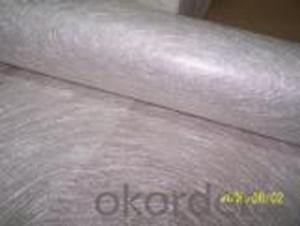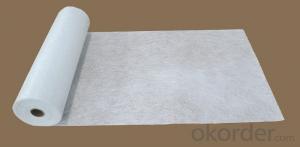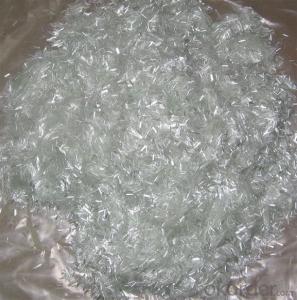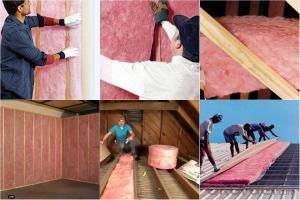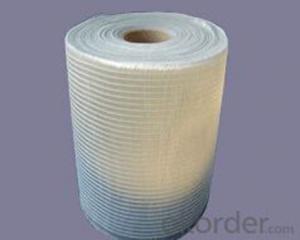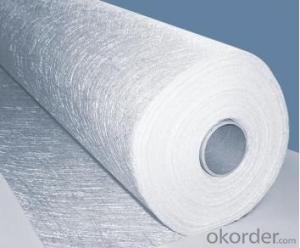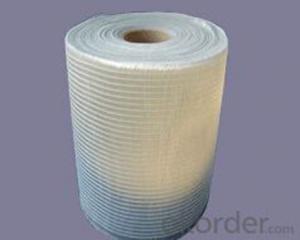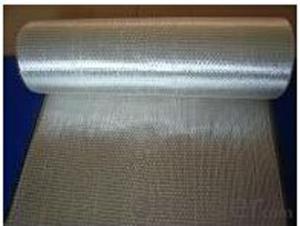Fiberglass Mat Tissue - e-glass Stitch Chopped Strand Mat 380gsm, 50-2400mm
- Loading Port:
- Shanghai
- Payment Terms:
- TT or LC
- Min Order Qty:
- 2000 m²
- Supply Capability:
- 20000 m²/month
OKorder Service Pledge
OKorder Financial Service
You Might Also Like
Description
Fiberglass stitch chopped strand mat is the mat made of fiberglass roving which is at first be cut into certain length and evenly unfolded in all directions and then stitched with polyester yarn.
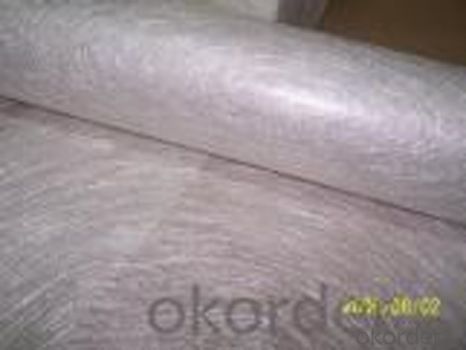
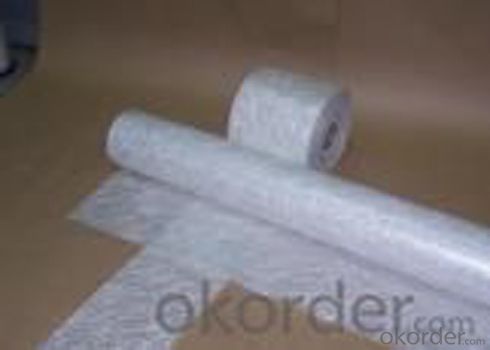
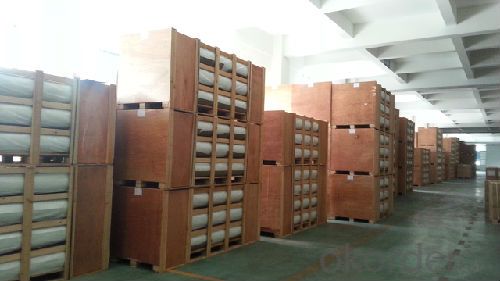
Products Traits
• Fiberglass no certain direction, good homogeneity.
• No powder or emulsion; sink quickly and easy to operate
• High tensile strength, easy to operate
• Good impact strength of finished products
Applications
Mainly be used as reinforced materials in the composite material industry.
• Matrix: unsaturated polyester resin, vinyl ester resin, epoxy resin and phenolic resin etc.
• Craft: winding, pultrusion, RTM, molded, hand lay up, etc.
• Ultimate products: Liner layer of tube, pultruded profiles, FRP body of boat, insulation board
Specifications
specifications | Fibre type | Areal weight | Width |
(g/㎡) | (mm) | ||
EMK 300 | E-Glass | 300 | 50-2400 |
EMK380 | E-Glass | 380 | 50-2400 |
EMK450 | E-Glass | 450 | 50-2400 |
CMK 300 | C-Glass | 300 | 50-2400 |
CMK380 | C-Glass | 380 | 50-2400 |
CMK450 | C-Glass | 450 | 50-2400 |
Packaging: Wrapped in PVC and placed within a cardboard carton. | |||
FAQ
1.Which country do you mainly export to?
A: Our products are very popular in Mid East, India, South East Asia, Latin America, Africa.
2.Pacage
Be wound onto a paper tube The roll is wrapped up with plastic film,and then packed in a cardboard box. The rolls can be vertically or horizontally placed. For transportation, the rolls can be loaded into a container directly or on pallets.
- Q: Can fiberglass mat tissue be used for insulation in chemical storage tanks?
- Yes, fiberglass mat tissue can be used for insulation in chemical storage tanks. It is a commonly used material due to its excellent thermal insulation properties and resistance to corrosion, making it suitable for protecting the tank and its contents from extreme temperatures and chemical reactions.
- Q: Can fiberglass mat tissue be used in high-temperature applications?
- No, fiberglass mat tissue is not suitable for high-temperature applications.
- Q: What are the applications of fiberglass mat tissue?
- Fiberglass mat tissue is commonly used in various applications, including but not limited to, the construction industry, automotive manufacturing, and the production of composite materials. It is used as a reinforcement material in the construction of walls, roofs, and floors, providing strength and durability. In the automotive industry, fiberglass mat tissue is used for sound insulation and as a reinforcement material in the production of car parts. Additionally, it is widely utilized in the manufacturing of composite materials, such as fiberglass-reinforced plastics, due to its high strength-to-weight ratio and excellent corrosion resistance.
- Q: Does fiberglass mat tissue provide good fire protection?
- No, fiberglass mat tissue does not provide good fire protection.
- Q: What is the expected lifespan of fiberglass mat tissue in chemical storage applications?
- The lifespan of fiberglass mat tissue in chemical storage applications can vary depending on several factors. These factors include the type and concentration of chemicals being stored, as well as the specific conditions of the storage environment. Fiberglass mat tissue is widely used in chemical storage applications because it has excellent corrosion resistance and provides structural reinforcement. However, it is important to note that fiberglass mat tissue is not completely immune to chemical degradation. In general, fiberglass mat tissue can withstand a wide range of chemicals and has a relatively long lifespan when properly maintained. It is typically designed to last for several years, and some manufacturers offer warranties ranging from 10 to 20 years. However, aggressive chemicals or extreme storage conditions can accelerate the degradation of fiberglass mat tissue. Chemicals with high acidity or alkalinity, extreme temperatures, or prolonged exposure to UV radiation can potentially reduce the lifespan of the material. To ensure the maximum lifespan of fiberglass mat tissue in chemical storage applications, it is crucial to carefully select the appropriate type of fiberglass mat tissue that is specifically designed for the intended chemicals and storage conditions. Regular inspections, maintenance, and proper handling of the chemicals can also help prolong the lifespan of the material. Ultimately, it is advisable to consult with the manufacturer or a qualified engineer to determine the expected lifespan of fiberglass mat tissue in a specific chemical storage application. They can provide more accurate information based on the specific circumstances.
- Q: Can fiberglass mat tissue be used in wet environments?
- Yes, fiberglass mat tissue can be used in wet environments. Fiberglass mat tissue is designed to be resistant to moisture and can withstand exposure to water, making it suitable for applications in wet environments. It is commonly used in industries such as construction, marine, and automotive, where components or structures are exposed to water, humidity, or moisture. The material's resistance to water ensures that it maintains its structural integrity and does not degrade or lose its performance properties when subjected to wet conditions.
- Q: Can fiberglass mat tissue be used for insulating ductwork?
- Yes, fiberglass mat tissue can be used for insulating ductwork.
- Q: Is fiberglass mat tissue suitable for sound absorption?
- Yes, fiberglass mat tissue is suitable for sound absorption. Fiberglass has excellent acoustic properties, making it an effective material for reducing noise levels and improving sound quality in various applications. The fibrous structure of the mat tissue provides a high surface area to absorb sound waves, converting them into heat energy. This makes it an ideal material for soundproofing walls, ceilings, and floors in buildings, as well as for use in automotive, industrial, and marine applications. Additionally, fiberglass mat tissue is lightweight, easy to install, and has good durability and fire resistance, further enhancing its suitability for sound absorption purposes.
- Q: What is the shelf life of fiberglass mat tissue?
- The shelf life of fiberglass mat tissue varies depending on the manufacturer and storage conditions. However, on average, fiberglass mat tissue can have a shelf life of up to 1-2 years if stored properly in a cool, dry place and protected from moisture and direct sunlight. It is important to check the manufacturer's recommendations for specific shelf life information.
- Q: Is fiberglass mat tissue compatible with different types of resins?
- Yes, fiberglass mat tissue is generally compatible with different types of resins. Fiberglass mat tissue is a versatile material that can be used in conjunction with various types of resins, including polyester, epoxy, and vinyl ester resins. The compatibility between the fiberglass mat tissue and the resin depends on several factors such as the specific type and formulation of the resin, as well as the intended application of the composite material. However, in most cases, fiberglass mat tissue can be used with different types of resins to create strong and durable composite materials. It is important to carefully follow the manufacturer's recommendations and guidelines for resin selection and application to ensure optimal compatibility and performance.
Send your message to us
Fiberglass Mat Tissue - e-glass Stitch Chopped Strand Mat 380gsm, 50-2400mm
- Loading Port:
- Shanghai
- Payment Terms:
- TT or LC
- Min Order Qty:
- 2000 m²
- Supply Capability:
- 20000 m²/month
OKorder Service Pledge
OKorder Financial Service
Similar products
Hot products
Hot Searches
Related keywords
